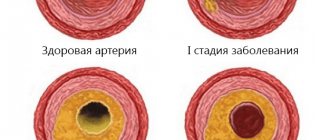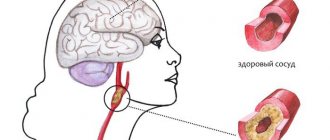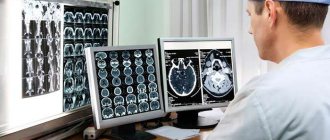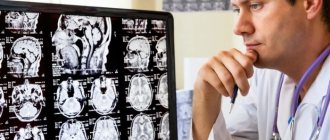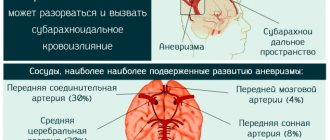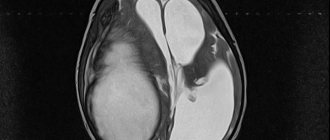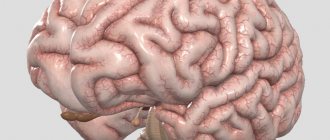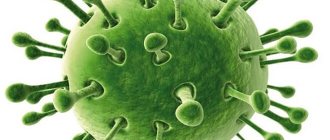Vasodilators are important elements of therapy in a number of complex cases. And you can’t do without them.
For example, increased pressure on the walls of blood vessels leads to their deformation and thinning, which can lead to hemorrhagic strokes. With osteochondrosis of the spine in the neck area, the main arteries are infringed. Pathological processes are accompanied by headaches, deterioration of cognitive functions and coordination, and other neurological disorders.
In all such cases, vascular drugs can provide significant assistance.
Causes of vasoconstriction
Heavy mental stress, poor environmental situation and stress, hereditary diseases are important factors that provoke loss of elasticity and premature wear of capillaries. Migraine, dizziness, memory loss and rapid fatigue are the first signs of vascular diseases.
Atherosclerosis. Accompanied by insomnia, depressed state and prolonged depression, deterioration of vision, hearing and memory, and frequent dizziness. It is characterized by a narrowing of the volume of the lumen of the blood flow with its subsequent blockage due to the proliferation of connective tissue, the appearance of cholesterol plaques and excessive deposition of calcium salts.
Cerebral vasospasm. The source of insufficient blood microcirculation is vascular dystonia, smoking, overwork, old age, osteochondrosis, hypertension and heart disease. People with this diagnosis experience fainting, slurred speech, and loss of motor activity.
Cerebrovascular accident. Accompanied by a decrease in visual and hearing acuity, seizures, deterioration in thinking, partial temporary paralysis, loss of reading, writing, and speech skills. Causes: plaques, blood clots, blood pressure surges, cervical osteochondrosis and head injuries.
Ischemia. Oxygen saturation of cells is hampered by diabetes, poor nutrition, anemia, kidney disease and tumors, and obesity. Signs of damage to the meninges include loss of concentration, outbursts of aggression, a shuffling gait and urinary incontinence.
Stroke. Congenital pathologies or atherosclerosis, heavy physical activity and arterial hypertension cause destruction of vascular walls, followed by hemorrhage, necrosis of tissue areas, and cell death.
to contents ^
Contraindications and side effects
Even the best vasodilators may have contraindications, and if the rules for taking them are violated, there is a high risk of side effects. Pregnancy and lactation require increased caution during therapy. You can take medications only after visiting a doctor and identifying the cause of the problem. Basic dosages are often reduced, otherwise there are unjustified risks for the fetus or newborn.
Despite the fact that acute cerebrovascular accident is often caused by narrowing or spasm of blood vessels, at the first signs of the condition it is prohibited to take certain vasodilators. The action of “No-Shpa” and “Papaverine” will spread to healthy vessels, and problem areas will suffer even more. In case of a cerebral stroke, it is allowed to use homeopathic products, but it is better to discuss this point with a specialist.
Properly selected vasodilator medications can improve the quality of life, relieve a number of unpleasant sensations and prevent the development of emergency conditions. Natural products used as prophylaxis can prolong youth. They will delay the appearance of signs of age-related degenerative changes in the brain. However, you cannot rely only on them. The desired results are possible only if you follow the rules of a healthy lifestyle and prevent vascular pathologies.
What are vasodilator drugs?
To achieve stable functioning of the central nervous system, new generation drugs are widely used. They differ depending on the mechanism and direction of their action:
- alpha - adrenergic blockers. Stimulate the expansion of the lumen and increase the peripheral bloodstream, reduce cholesterol levels and normalize blood glucose levels;
- calcium channel blockers. They have a vasodilator, relaxing effect on the walls of capillaries and coronary arteries, which contributes to their expansion. Lower blood pressure and prevent calcium from entering cells;
- Vasolidators or vasodilators. Reduce the speed of blood flow and the force of pressure on the walls of the arteries, increase their lumen, improve the nutrition of tissues and cells;
- neurotropic drugs. Regulate and restore the functions of the peripheral part of the central nervous system;
- myotropic antispasmodics. Reduce and relax muscle tone;
- disaggregants. Prevents the formation of blood clots and narrowing of the blood flow lumens.
Useful to know: Effective drugs to improve memory and brain function
Natural homeopathic remedies, herbal remedies and dietary supplements are used as adjuvant therapy or in combination with other medications.
to contents ^
Ganglioblockers
Heterogeneous means. The basis of the pharmaceutical effect lies in the ability to block the conduction of certain nerve fibers responsible for regulating vascular tone, thereby eliminating excess stenosis, restoring normal blood flow and lowering blood pressure.
All drugs of this type are classified as emergency drugs, because on the one hand, a rapid and pronounced effect is observed: blood pressure levels drop, the heart rhythm is restored, and the general condition returns to normal.
On the other hand, the medicine provokes a lot of side effects, sometimes severe and uncomfortable: from hypotension to persistent constipation.
Pentamin
Has many analogues. Refers to drugs that block sympathetic and parasympathetic ganglia. Thanks to this, a non-selective, strong effect is achieved in a short time.
The medication is available in ampoules for intravenous and intramuscular administration, it provokes a lot of side effects, the risk of which is also much higher when compared with analogues. It is prescribed strictly according to indications, for example, as part of the relief of a hypertensive crisis.
Quateron
Blocks conduction only of the parasympathetic ganglia. Formally, it is considered safer. If we compare it with the above-mentioned subgroup of ganglion blockers.
It is used in most cases when the condition allows one to limit oneself to less severe means.
Dimecoline
There are no fundamental differences in safety and effectiveness from Quateron. However, it poses an additional threat to women, especially during pregnancy. Regardless of the stage.
It has a negative effect on the tone of the uterus, therefore it is categorically inapplicable to patients of this group. Has several analogues.
Attention:
All ganglion blockers in one way or another affect the state of other organs that are innervated sympathetically. Therefore, side effects and dangerous effects in some cases cannot be avoided.
The question is choosing the right name and adequate dosage situation.
Vasodilation
In order to prevent serious consequences, which are associated primarily with dangerous disturbances in the flow of blood into the membranes of the brain and other organs of the central nervous system, doctors offer their patients medications for narrowing of the lumen and insufficient conductivity of the microvasculature.
"Piracetam." An effective drug for the treatment of cerebrovascular insufficiency and slow blood flow. The vasodilator suppresses platelet aggregation, improves microcirculation, and increases glucose sensitivity. It is prescribed in a dosage of 30 to 160 mg per kilogram of a person’s weight.
"Mexidol". It is recommended to take it for recovery after identified problems with cerebral circulation, head injuries, encephalopathy and vegetative dystonia. Normalizes the speed of blood movement, reduces platelet aggregation, and reduces the amount of bad cholesterol. The dosage per day is 125 - 250 mg 3 times.
"Pentoxifylline." Indications: ischemic conditions, cerebral atherosclerosis, acute processes of blood circulation disorders. Dilates coronary arteries, reduces blood viscosity and improves blood flow. Tablets are taken at a rate of 600 mg per day. The number of receptions is 2-3 times.
to contents ^
Literature
- Kharkevich D.A. Pharmacology. M.: GEOTAR MED, 2001.
- Belenkov Yu.N., Mareev V.Yu. Principles of rational treatment of heart failure. M.: Consilium Medicum, 2001.
- Vidal Directory. Medicines in Russia: Directory. - AstraPharmService, 2002.
- ACC/AHA Guidelines for the Evaluation and Management of Chronic Heart Failure in the Adult: Executive Summary A Report of the American College of Cardiology/American Heart Association Task Force on Practice Guidelines (Committee to Revise the 1995 Guidelines for the Evaluation and Management of Heart Failure): Developed in Collaboration With the International Society for Heart and Lung Transplantation; Endorsed by the Heart Failure Society of America. // Circulation 2001.
- ESC Guidelines on Diagnosis and Treatment of CHF // European Heart Journal. - 2001.
- HFSA practice guidelines. HFSA guidelines for management of patients with heart failure caused by left ventricular systolic dysfunction - pharmacological approaches // Journal of Cardiac Failure.- 1999.
Drug treatment of atherosclerosis
The danger of cholesterol plaques manifests itself in the form of the formation of blood clots, thrombi, a decrease in the volume of the lumen of the vascular bed and its complete blockage, which can cause myocardial infarction. That is why it is recommended to take effective modern drugs to treat atherosclerosis.
"Betaserk." Relieves unnatural noise in the ears, frequent migraines and dizziness. Used as part of complex therapy for post-traumatic encephalopathy. It has a positive effect on blood flow and the peripheral vestibular apparatus. Daily intake: 16 drops 2-4 times. Do not chew, drink with a small amount of water.
"Papaverine". An antispasmodic agent that reduces calcium content in cells, relaxes muscle tissue and vascular walls, and slows intracardiac conduction. Take no more than 60 mg 3 times per day.
"Lovastatin." Prevents excess cholesterol in the body, prevents the development of atherosclerosis, and corrects lipid metabolism. It is prescribed orally once a day, 10-20 mg in the evening.
Useful to know: Alcoholic epilepsy: symptoms, causes and treatment
to contents ^
Beta blockers
Beta-adrenergic receptors are located in the heart, blood vessels and some internal organs.
The basis of the pharmaceutical effect is already familiar: preventing the influence of adrenal hormones on sensitive tissues, preventing vasoconstriction.
- Selective ones are used less frequently due to their comparatively lower efficiency.
- Non-selective beta blockers give more pronounced results, but provoke side effects from organs and systems: lungs (bronchospasm is possible), uterus (spontaneous contractions).
The following names are actively used:
- Propranolol. Non-selective medicine. Prescribed for systemic therapy of arterial hypertension, as well as relief of acute attacks of tachycardia. Taken constantly, for a long time. Abrupt cancellation is excluded, because a “rollback” occurs in the state.
- Metoprolol. Prescribed as part of long-term therapy for heart diseases.
- Bisoprolol. Used to eliminate acute conditions. In complex.
The Beta blocker group is discussed in detail in this article.
How to relieve spasm of cerebral vessels
You can get rid of causeless migraines, constant fatigue and irritability, which are caused by cerebral vasospasm, only after taking special medications prescribed by your doctor, indicating the exact dosage and number of doses.
"Cinnarizine." It has a calming, vasodilating effect on muscle tissue and the walls of blood arteries, reduces the manifestations of vestibular disorders, prevents the development of atherosclerotic plaques and reduces the level of blood viscosity. Prescribed for the prevention of ischemic and hemorrhagic stroke. The vasodilating effect is detected after using no more than 225 mg of Cinnarizine or 24 drops per day. This amount must be divided into 3 times.
"Drotaverine hydrochloride." Reduces the manifestations of muscle spasms and short-term functional disorders of cerebral circulation, which lead to spasm of the peripheral, cerebral and coronary arteries. Daily intake of 40-80 mg 3 times.
"A nicotinic acid". Helps accelerate the passage of blood by expanding the lumen between the vascular walls, normalizes the activity of the microvasculature, and prevents the development of ischemic disorders. For severe atherosclerosis, 2-3 grams per day are prescribed.
to contents ^
The main task
The main task of vasodilators is to organize the delivery of oxygen to brain cells. The blood vessels enlarge and circulatory activity decreases. This ensures that oxygen and beneficial elements are freely delivered to the brain tissue, and toxic substances from the brain tissue enter the general bloodstream. This property of vasodilator drugs is especially important if:
- The vessel is clogged with cholesterol plaque or vein thrombosis is noted. Also, these medications are required when the walls of the capillaries have become thicker due to the process of inflammation taking place in them.
- The vessel is compressed due to the proliferation of bone tissue, resulting edema or tumor. For this reason, vasodilators for the vessels of the head and neck are prescribed to normalize blood circulation in the brain to patients, despite swelling and the appearance of osteophytes.
All medications prescribed for this purpose have an effect on small vessels.
Vasodilator medications are also prescribed for hypertension. In this case, their active substances already act on large vessels. Under the influence of drugs, they increase, and their capacity is greater. Due to this, high blood pressure gradually decreases.
There is a classification of vasodilators taking into account the main purpose of their use. The drugs can be used for:
- lowering blood pressure levels;
- treatment of cardiovascular diseases (including during the development of angina pectoris);
- headache relief;
- improving blood flow in the vessels of the brain (with osteochondrosis, cephalgia, arthrosis);
- treatment of vascular diseases of the lower extremities (endarteritis, atherosclerosis);
- decreased intracranial pressure (for example, with glaucoma).
Almost all groups of drugs have certain subgroups. They affect the same vessels, but their points of action are different. Taking this into account, the doctor is guided by different criteria when choosing a medicine:
- the presence of chronic diseases (for certain diseases, some medications are prohibited from taking);
- specific vessels that need to be affected;
- task of vasodilation.
Medicines to improve cerebral circulation
It is possible to resume the stable operation of the processes occurring in the organs of the central nervous system if you follow the exact instructions for natural medicinal products and modern vasodilating drugs.
"Actovegin". Promotes oxygen saturation of tissues and organs, has an antioxidant effect, restores blood flow, and prevents the onset of ischemic stroke. Daily dosage: 1-3 capsules before meals 3 times. Intravenous administration involves 10-15 ml of the drug in combination with a 0.9% NaCl solution or 5% dextrose.
“Vazobral.” Vasodilating drug. Reduces the permeability of the vascular wall, restores cerebral circulation, increases mental activity, reflex excitability of the spinal cord and increases the activity and stability of the brain. Eliminates attention, memory and vestibular complications. Prescribed 0.5 - 1 tablet in the morning and evening. In the form of a solution, it is recommended to take 2-4 ml twice a day.
"Cavinton". Restores the acuity of hearing and vision, which were caused by damaged and lost elasticity of the brain vessels. Improves cerebral circulation, stimulates the intensity of oxygen supply to cells and tissues, and has a vasodilating effect. Prescribed for motor and neurological disorders.
to contents ^
Traditional methods
If a certain vasodilator is contraindicated for use, then you can use traditional medicine recipes. The following remedies will help cope with unpleasant symptoms:
- Orange and lemon zest must be twisted using a meat grinder. Add 4 tsp to the composition. honey and mix thoroughly. Let stand for one night, then take 25 ml three times a day. The medicine cleanses blood vessels well.
- Periwinkle and hawthorn. To make a decoction, you need to mix 0.5 tbsp. l. fresh leaves of each plant and add two glasses of water. Place on the stove, let it boil and then leave for two hours. Drink half a glass before meals.
- It is useful to regularly massage your head. Combing your hair with a massage brush is a great way to increase blood flow in the brain.
- It is necessary to give up unhealthy foods: fried, smoked and salty foods. In rare cases, drinking alcohol is not prohibited, but in small doses.
In order not to have to use vasodilators, you need to take care of the prevention of blood vessel diseases in advance. The main problem of these pathologies is that at the first stage of their development they do not manifest themselves with almost any symptoms. Accordingly, it is practically impossible to respond to them in time and begin treatment.
Treatment of cerebral vascular ischemia
Oxygen starvation, which affects all organs of the central nervous system without exception, the lack of natural blood circulation and impaired brain activity are the consequences of ischemia. Without medical treatment with the use of vasodilators, it is impossible to help restore the body.
Useful to know: Foods for efficient brain function
"Nimotop". To prevent neurological disorders, hemorrhagic and ischemic stroke, vasospasm, stabilize the functioning of neurons and block the entry of calcium into cells, intravenous administration of an infusion solution diluted with 0.9% NaCl is prescribed. In the form of tablets you need to take 3 pieces.
"Dipyridamole." The main indications for taking the drug, after which the coronary blood flow expands and the speed of its movement increases, are ischemia, low blood pressure, and thrombosis. The dosage per day should not exceed 25-50 mg.
"Enduracin" or nicotinic acid. Expands small capillaries, increases motor activity in the bloodstream. For atherosclerosis, the recommended dose is 2-3 grams per day, for the purpose of prevention - 15-25 mg per day.
to contents ^
Calcium antagonists
They regulate the penetration of ions of this element into the structures of blood vessels. When the intensity of the metabolic process decreases, the arteries dilate.
This effect is used to treat hypertension, prevent stroke, and heart attack. Medicines are used in clinical practice and cardiological activities.
Main titles:
- Diltiazem, Varepamil. In general, identical in quality of action.
- Amlodipine, Nifedipine.
There are others too. The difference is minimal. The question of choosing a specific medicine falls on the shoulders of a specialist. Read about the group of Calcium Antagonists here.
List of medications for cerebral stroke
Blockage of the bloodstream and oxygen starvation, arterial hypertension and diabetes mellitus, lack of nutrients and elements provoke ischemic stroke. After an attack, the patient is prescribed medications to restore brain activity and normalize blood pressure.
"Clopidogrel." Patients with ischemic stroke, increased aggregation of blood clots and impaired peripheral circulation are prescribed a daily dosage of one tablet.
"Prestarium". It is recommended to take it as part of a complex treatment of ischemic cerebral circulation and arterial hypertension. The dosage in tablets is 1-2 pcs. Drink 1 time in the morning.
"Ceraxon." The nootropic active ingredient promotes the restoration of cells and damaged tissues. Reduces the effects of memory loss, improves attention and thinking. In case of traumatic brain injuries, it reduces the duration of associated symptoms. In the acute ischemic period, intravenous administration of 1000 ml is recommended.
to contents ^
Mechanism of operation
The mechanism of action of vasodilator drugs is based on restoring cerebral blood flow, relaxing and strengthening the walls of blood vessels that are affected by spasm. The doctor prescribes these drugs based on the following tasks:
- restore brain function;
- enrich brain cells with useful elements and oxygen;
- improve blood flow in brain tissue.
Vasodilator drugs do not allow hypoxia, thereby eliminating the possibility of cell death. In addition, these medications help:
- improving metabolism;
- restoration of venous circulation;
- relieving vascular spasms;
- restoration of energy metabolism in brain neurons;
- normalization of blood circulation in osteochondrosis and coxarthrosis.
For superficial arteries
Superficial blood vessels often go into spasm when a patient becomes hypertensive or has high blood pressure. It has not yet been diagnosed like hypertension, but there is a possibility of transformation into a chronic form of this disease.
The most effective and widely used vasodilators for the brain include:
Vasodilator drug for the brain Nifedipine is a medicine related to calcium antagonists. Helps reduce cardiac stress and the overall resistance of blood vessels, which makes it possible to lower blood pressure.
A vasodilator for the brain , Enalapril is a medication used to treat hypertension. It can be used for a long time and has a persistent relaxing effect on blood vessels.
These vasodilator drugs for the brain are prescribed to people who have hypertension, heart failure, and coronary heart disease. A vasodilator drug for the brain is taken for quite a long time, and sometimes for the rest of your life. To make the drugs convenient to take, they are produced in tablet form with different dosages of the active ingredient.
Contraindications to vasodilator drugs for the brain include the following factors:
- Individual intolerance to the ingredients that make up the product;
- Severe drop in blood pressure;
- Use of other medications that are not compatible with these medications.
With long-term use of these vasodilators for the brain, constant monitoring of blood pressure and periodic blood donations are prescribed to check the amount of electrolytes and biochemical composition. If there are changes in any indicators, you need to seek help from a doctor; it may be necessary to: adjust the dosage or replace the medication.
Quick-acting remedies for high blood pressure
When it is necessary to quickly reduce high blood pressure, medications are prescribed that can do this in a short time. The following drugs, which have a short-term but strong effect, are suitable for this:
- Enalapril;
- Captopril;
- Adelfan;
- Anaprilin.
If your blood pressure has risen sharply, it is recommended to take half or a whole tablet of one of the above remedies. After 20 minutes, the pressure will drop to normal values.
The effect of these drugs does not last long, so after some time the use may have to be repeated.
Diuretics, for example, Furasemide, can also quickly relieve an attack of hypertension.
It stabilizes blood pressure by removing excess fluid from the body. It should be noted that hypertension is a chronic disease that requires constant maintenance of normal blood pressure with medications. For this purpose, long-acting drugs are prescribed, for example:
- Propranolol;
- Losartan;
- Bisoprolol;
- Cordaflex.
They should be taken once a day, the effect lasts for 24 hours or more.
Combinations of medicinal products
In the normal course of hypertension, first-line drugs are prescribed - calcium channel blockers, adrenergic blockers, diuretics and inhibitors.
If the disease occurs in a more serious form and is combined, for example, with kidney disease, doctors recommend taking peripheral adrenergic blockers and central adrenergic agonists. And also read on our website: Capsules for hypertension Cardiowell (CardioWell) - a scam or not, reviews from doctors, price and where to buy?
In severe cases, a combination of diuretic diuretics and calcium blockers, or a combination of adrenergic blockers and diuretics, is possible. It is important to know that the combined use of drugs may aggravate the negative effects of each other, and may also not have the desired effect. Therefore, only a qualified specialist can prescribe a combination of drugs for hypertension.
Magnesium-based medications
The drug includes active ingredients: magnesium sulfate and pyridoxine hydrochloride (vitamin B6). A lack of microelements and vitamins leads to disruption of organ function and deterioration of general well-being.
The microelement has a positive effect on the nervous system of the body. It helps relax muscle tissue. Magnesium has a sedative effect due to increased inhibition processes in the cerebral cortex.
The product is widely used to reduce the tone of the uterus in pregnant women, eliminating increased fatigue and irritability.
Magnesium restores the rhythm of the heart, nourishing its muscle, and effectively lowers blood pressure. A small number of contraindications makes it possible to successfully treat spasms, tics, convulsions, and tachycardia caused by magnesium deficiency.
The addition of vitamin B6 enhances their mutual effect. The drug is used to prevent urolithiasis, strengthen vascular walls, and help eliminate toxins.
